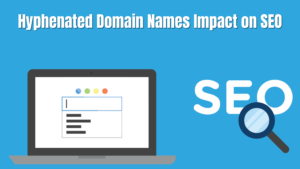Hyphenated Domain Names Impact on SEO
In the realm of SEO, every aspect of your website matters. From the quality of your content to the structure of your URLs, each element plays a role in determining your search engine rankings. One aspect that often sparks debate among website owners and SEO professionals alike is the use of hyphens in domain names. While some argue that hyphens can have a negative impact on SEO, others believe they are inconsequential. So, does your domain’s hyphen hurt SEO? Let’s delve into the topic to gain a better understanding of its impact on search rankings.

The Role of Hyphens in Domain Names
Before diving into the SEO implications, it’s essential to understand the role of hyphens in domain names. Hyphens are commonly used to separate words within a domain when the desired domain name without hyphens is unavailable. For example, if “exampledomain.com” is already taken, one might opt for “example-domain.com” instead.
When it comes to choosing a domain name for your website, every detail matters. Hyphens, despite being seemingly small characters, can have a significant impact on the overall effectiveness of your domain. Here’s a closer look at the role hyphens play in domain names:
1. Availability:
One of the primary reasons for using hyphens in domain names is availability. In a vast digital landscape where millions of domain names are already registered, finding an available name that perfectly matches your brand or desired keywords can be challenging. Hyphens offer a workaround by allowing you to create a domain name that includes your desired keywords or brand elements while separating them with hyphens.
2. Readability and Clarity:
Hyphens can enhance the readability and clarity of domain names, especially when the desired name without hyphens is already taken or unavailable. By separating words with hyphens, you create a distinct visual separation, making it easier for users to understand and remember your domain name. This can be particularly beneficial if your domain name consists of multiple words or if the words are concatenated without spaces, which could lead to confusion.
3. Search Engine Optimization (SEO):
From an SEO perspective, hyphens can play a role in improving keyword clarity within your domain name. Search engines use various signals to understand the relevance and content of a website, including the words used in the domain name. Hyphens act as separators, allowing search engine algorithms to identify individual keywords more effectively. This can potentially improve the keyword relevance and ranking of your website for relevant search queries.
4. Branding and Brand Protection:
In some cases, hyphenated domain names can also serve as a branding strategy or a means of brand protection. By incorporating hyphens, you can create a domain name that aligns closely with your brand identity or core keywords. Additionally, hyphenated variations of your domain name can help prevent domain squatting or hijacking, where others register similar domain names to capitalize on your brand’s reputation or traffic.
5. Industry Norms and Trends:
Finally, the role of hyphens in domain names can also be influenced by industry norms and trends. In certain sectors or niches, hyphenated domain names may be more prevalent or accepted than in others. Understanding the conventions and preferences within your industry can help you make an informed decision about whether to include hyphens in your domain name.
In summary, hyphens serve multiple purposes in domain names, ranging from improving availability and readability to enhancing SEO and branding efforts. While they can be a valuable tool in certain contexts, it’s essential to weigh the pros and cons carefully and consider how hyphens align with your overall branding and SEO strategy.
Pros and Cons of Hyphenated Domain Names
SEO Impact of Hyphenated Domain Names
Now, let’s address the million-dollar question: Does using hyphens in your domain name hurt SEO?
Keyword Stuffing vs. Keyword Clarity:
In the early days of SEO, keyword stuffing was a common practice, wherein website owners would cram as many keywords as possible into their domain names to improve rankings. However, search engines have evolved significantly since then, prioritizing user experience and relevance over keyword density. While hyphens can help separate keywords for clarity, excessive hyphenation may come across as spammy and could potentially harm your SEO efforts.
Backlinking Challenges:
Another factor to consider is the impact of hyphenated domain names on backlinking. When other websites link to yours, they typically use your domain name as the anchor text. Hyphens can make the domain name appear fragmented, potentially leading to inconsistencies in anchor text and affecting the perceived authority of your website.
User Experience and Trust:
Ultimately, SEO is not just about appeasing search engine algorithms; it’s also about providing a positive user experience. Users tend to trust and prefer websites with clean, memorable domain names. Hyphenated domain names may raise doubts about the legitimacy and credibility of a website, potentially leading to lower click-through rates and conversions.
Conclusion
While the debate over the SEO impact of hyphenated domain names continues, it’s clear that their influence is multifaceted. While hyphens can aid in keyword clarity and readability, they also present challenges in terms of user perception and backlinking. Ultimately, the decision to use hyphens in your domain name should be based on careful consideration of your branding, user experience, and long-term SEO strategy. By weighing the pros and cons outlined in this article, you can make an informed decision that aligns with your overall business goals and objectives.
————————————————————————————————————————————————–






